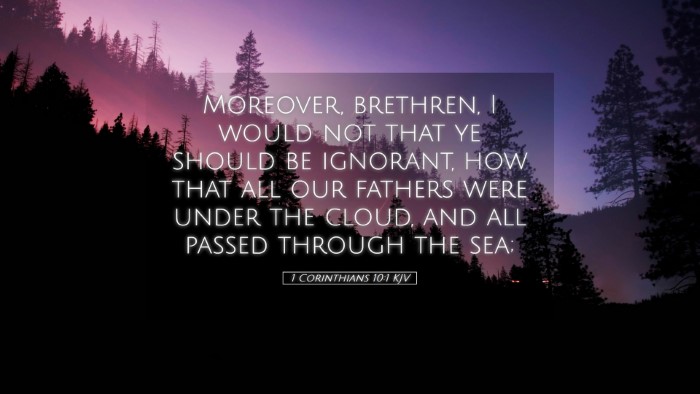Commentary on 1 Corinthians 10:1
Verse: 1 Corinthians 10:1 - "Moreover, brethren, I would not that ye should be ignorant, how that all our fathers were under the cloud, and all passed through the sea."
Introduction
This verse serves as a bridge between the history of Israel's exodus from Egypt and the theological implications for the Christian believers in Corinth. The Apostle Paul’s use of historical analogy elucidates spiritual truths relevant to both Jewish and Gentile converts in the Church. By referring to the ‘cloud’ and the ‘sea’, Paul invokes the powerful narrative of the Exodus, encouraging believers to learn from the historical precedents of God's people.
Historical Context
The reference to ‘our fathers’ in this verse clearly indicates that Paul is speaking to a predominantly Gentile audience, affirming their inclusion in the lineage of God's covenantal purposes through Christ.Matthew Henry highlights this point, emphasizing the unity of believers as part of the spiritual lineage traced back to Israel’s deliverance from oppression.
Exegesis and Theological Insights
1. The Cloud:
- The ‘cloud’ symbolizes God’s guiding presence. As noted by Albert Barnes, the cloud that led the Israelites signifies divine guidance and protection, illustrating that believers in Christ also have the Holy Spirit as their guide.
- This cloud was a physical manifestation of God's presence, indicating to the Corinthians that they too partake in the divine community that once accompanied Israel.
2. The Sea:
- Passing through the Red Sea represents both physical salvation from slavery and spiritual baptism. Adam Clarke elaborates on how this event serves as a type of Christian baptism, highlighting its significance in the believer's identification with Christ’s death and resurrection.
- This endorsement of baptism as an act of faith further solidifies the connection believers have to the experiences of their forefathers.
Spiritual Lessons
Paul's admonition for the Corinthians not to be ‘ignorant’ encourages a diligent engagement with their spiritual heritage. Here are some lessons derived from the text:
- Awareness of Heritage: Understanding Israel's history helps Christians appreciate their identity in Christ. The events of Exodus were not merely historical occurrences but have present implications for faith and conduct.
- Warning Against Complacency: Both Matthew Henry and Albert Barnes caution against the danger of neglecting the lessons from history, which may lead to complacency in one's faith. This sentiment is echoed in the subsequent verses, where Paul warns about the consequences of disobedience.
Ethical Implications
In light of the historical narrative Paul references, the ethical implications are significant for the Corinthian church.
- The Nature of Community: Paul emphasizes that all his ‘fathers’ shared in communal experiences, which teaches the church about the importance of unity and shared faith experiences. As believers, we are called to foster these values within the church.
- Responsibility to Learn: In his writings, Adam Clarke frequently stresses the responsibility of believers to learn from both the triumphs and failures of previous generations, urging the Corinthians not to repeat past mistakes.
Conclusion
1 Corinthians 10:1 serves not only as a reminder of the great acts of God in the history of Israel but as a powerful exhortation for the church today. Paul’s message is clear: just as God led His people through trials and stretched their faith, He does the same for us through Christ. Understanding our spiritual heritage deepens our faith, fosters unity, and compels us to live responsibly as a community of believers. The implications are vast and invite continuous reflection on how the lessons of the past resonate with our current spiritual journey.


